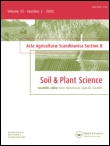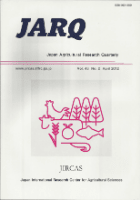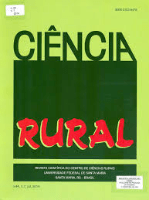
AGRONOMIA MESOAMERICANA
Scope & Guideline
Fostering collaboration in the heart of Mesoamerica's agriculture.
Introduction
Aims and Scopes
- Sustainable Agriculture Practices:
Research emphasizing eco-friendly techniques, soil health, and sustainable management practices to enhance productivity while minimizing environmental impacts. - Crop and Livestock Management:
Studies focusing on the management of various crops and livestock species, including nutritional studies, breeding, and management practices to improve yield and quality. - Agroecology and Biodiversity:
Exploration of agroecological principles that enhance biodiversity and ecosystem services in agricultural systems, including studies on intercropping and agroforestry. - Biotechnological Innovations:
Research on the application of biotechnological methods in agriculture, including genetic engineering, microbial inoculants, and biofertilizers to enhance crop production. - Nutritional and Sensory Analysis:
Investigations into the nutritional value and sensory characteristics of agricultural products, contributing to food quality and safety. - Soil and Water Management:
Studies on soil health, erosion control, water use efficiency, and irrigation techniques to improve agricultural resilience.
Trending and Emerging
- Climate-Resilient Agriculture:
Research focusing on practices that enhance the resilience of agricultural systems to climate change is on the rise, addressing immediate concerns of food security and sustainability. - Agroecological Systems:
There is a growing interest in agroecological approaches that integrate ecological principles into farming, promoting biodiversity and sustainable land use. - Nutritional Quality and Functional Foods:
An increase in studies examining the nutritional profiles and potential health benefits of agricultural products, including functional foods, reflects a broader public interest in health and wellness. - Digital Agriculture and Precision Farming:
Emerging technologies in agriculture, including precision farming techniques and data analytics, are gaining traction as farmers seek to optimize resources and improve yield efficiency. - Biological Control and Integrated Pest Management (IPM):
Research on biological control methods and integrated pest management strategies is trending, emphasizing sustainable practices that reduce reliance on chemical pesticides.
Declining or Waning
- Traditional Crop Varieties:
There has been a noticeable reduction in studies focusing on traditional or heirloom crop varieties, as the emphasis shifts toward genetically enhanced or hybrid crops that promise higher yields. - Conventional Pest Control Methods:
Research on traditional pest control methods is diminishing, likely due to the growing interest in integrated pest management and organic farming practices that prioritize sustainability. - Single Crop Systems:
The focus on monoculture or single crop systems is waning as more research highlights the benefits of diversification and polyculture systems for ecological balance and resilience. - Livestock Production without Environmental Considerations:
Studies that do not incorporate environmental impact assessments in livestock production are becoming less common, as sustainability becomes a central theme in agricultural research. - Chemical Fertilization Practices:
There is a decline in papers focusing solely on chemical fertilization methods, with a shift towards organic and sustainable fertilization techniques that enhance soil health.
Similar Journals

PHILIPPINE AGRICULTURAL SCIENTIST
Bridging Research and Practice in Agricultural Sciences.PHILIPPINE AGRICULTURAL SCIENTIST is a pioneering journal published by the University of the Philippines Los Baños, dedicated to advancing the fields of Agronomy, Crop Science, Animal Science, and Biotechnology. With an ISSN of 0031-7454, this esteemed journal provides a vital platform for researchers and practitioners focusing on agricultural innovations and practices in the Philippines and beyond. With a robust history dating back to 1996 and continuing through 2024, the journal operates within the Q4 quartile, reflecting its potential for growth and impactful contributions in its categories. Despite currently being positioned in the lower ranks, it serves as an essential publishing venue for nascent studies and localized research, contributing to the agricultural discourse. The journal fosters a collaborative research environment, encouraging submissions from both emerging scholars and seasoned experts, making it a valuable resource for students, professionals, and researchers engaged in the agricultural sciences. While it currently does not offer open access, it plays a crucial role in disseminating vital knowledge aimed at enhancing agricultural practices in the region.

Revista de la Facultad de Agronomia de la Universidad del Zulia
Innovating Agriculture: Insights from the Heart of VenezuelaWelcome to the Revista de la Facultad de Agronomia de la Universidad del Zulia, a key publication in the fields of Agronomy, Animal Science, Food Science, and Plant Science. Published by the Facultad de Agronomía, Universidad del Zulia, this journal aims to foster academic dialogue and disseminate impactful research that advances knowledge and practice within these disciplines. Operating under the ISSN 0378-7818 and E-ISSN 2477-9407, this journal offers a platform for both emerging and established scholars to share their discoveries and innovations. Despite its challenges, as reflected in its Q4 ranking across multiple categories in 2023, it remains a vital resource for the Venezuelan scientific community and beyond. Readers will benefit from a diverse array of studies and discussions that address contemporary issues in agriculture and related fields, helping inform best practices and policy. Engage with cutting-edge research from Venezuela and contribute to the development of agronomic sciences in the region.

REVISTA DE LA FACULTAD DE CIENCIAS AGRARIAS
Nurturing Ideas, Growing Solutions in Plant Sciences.REVISTA DE LA FACULTAD DE CIENCIAS AGRARIAS is an esteemed academic journal published by UNIV NACIONAL CUYO, FAC CIENCIAS AGRARIAS, located in Chacras de Coria, Mendoza, Argentina. As a pivotal publication in the fields of Agronomy and Plant Science, it has achieved a commendable Q2 ranking in both categories, indicating its relevance and impact within the scientific community. Since its establishment as an Open Access journal in 2007, it has facilitated the dissemination of crucial research, fostering collaboration and innovation among researchers, professionals, and students alike. The journal's converged years from 2008 to 2024 allow it to present contemporary advancements and discussions related to agricultural practices and plant sciences. With a strong commitment to quality and accessibility, REVISTA DE LA FACULTAD DE CIENCIAS AGRARIAS provides a valuable platform for those engaged in the crucial exploration of sustainable agricultural methodologies and plant innovations.

ACTA AGRICULTURAE SCANDINAVICA SECTION B-SOIL AND PLANT SCIENCE
Transforming Research into Real-World Agricultural SolutionsACTA AGRICULTURAE SCANDINAVICA SECTION B-SOIL AND PLANT SCIENCE, published by Taylor & Francis AS, is a distinguished journal dedicated to the fields of Agronomy, Crop Science, and Soil Science. With an impressive impact factor, and categorized in Q2 for both Agronomy and Crop Science and Soil Science as of 2023, this journal is an essential resource for researchers, professionals, and students aiming to advance their understanding of soil-plant interactions and sustainable agricultural practices. Operating since 1992 and continuing through to 2024, ACTA aims to publish high-quality, peer-reviewed research that encourages the applicability of advanced scientific knowledge in real-world agricultural settings. While the journal is not open access, it remains widely accessible through institutional subscriptions, reflecting its commitment to disseminating essential findings and fostering innovation in soil and plant science worldwide. Nestled in the vibrant academic environment of Norway, ACTA AGRICULTURAE SCANDINAVICA serves as a key platform for nurturing groundbreaking research that informs sustainable agricultural policies and practices globally.

Agrarforschung Schweiz
Exploring the intersection of science and sustainability in agriculture.Agrarforschung Schweiz is a premier journal dedicated to advancing the fields of agronomy, animal science, food science, and environmental studies. Published by AGRARFORSCHUNG in Switzerland, this journal serves as a vital platform for the dissemination of research findings that address contemporary challenges in agriculture and food systems. With an emphasis on open access, researchers and practitioners are encouraged to share their work, fostering a collaborative environment for knowledge exchange. Although currently listed in Q4 of several agricultural categories, the journal is poised for growth and aims to enhance its impact within the academic community. It features a wide range of topics from innovative agricultural practices to sustainability and pollution management, catering to a diverse audience of researchers, students, and industry professionals. Given the rich agricultural heritage of Switzerland, Agrarforschung Schweiz aspires to contribute meaningfully to global discussions and advancements in agricultural sciences through rigorous peer-reviewed research and insights.

AIMS Agriculture and Food
Empowering research for a resilient food system.AIMS Agriculture and Food is a leading open access journal published by the American Institute of Mathematical Sciences (AIMS), focused on the critical intersections of agricultural and food sciences. Since its inception in 2016, this journal has provided a vital platform for disseminating innovative research and advancements in the fields of agricultural and biological sciences and food science. With impressive Scopus rankings, including a Q2 categorization in 2023 for both Agricultural and Biological Sciences (miscellaneous) and Food Science, AIMS Agriculture and Food is recognized for its significant contributions to the academic community. The journal aims to foster interdisciplinary dialogue by welcoming submissions that tackle contemporary challenges, promote sustainable practices, and enhance food security. Researchers, professionals, and students will find this journal an invaluable resource, offering open access to high-quality, peer-reviewed articles that are essential for informed decision-making in agriculture and food industries.

JARQ-JAPAN AGRICULTURAL RESEARCH QUARTERLY
Transforming Agricultural Strategies Through KnowledgeJARQ - Japan Agricultural Research Quarterly serves as a pivotal platform in the field of agricultural sciences, published by the esteemed Japan International Research Center for Agricultural Sciences. Established in 1973, this journal has a rich history and plays a critical role in disseminating significant research findings relevant to agronomy, crop science, animal science, ecology, and biotechnology. Despite its ranking in the lower quartiles, with impressive coverage from 1973 to 2024, it continues to attract contributions that enhance agricultural strategies and practices in Japan and beyond. The journal facilitates discussions that are essential for fostering innovation in agricultural methodologies and environmental sustainability. Accessible to a diverse audience, including researchers, academics, and practitioners, JARQ emphasizes the importance of advancing agricultural research and its implications for food security and ecological balance.

CIENCIA RURAL
Nurturing the future of agriculture through knowledge exchange.CIENCIA RURAL, published by the Universidade Federal de Santa Maria in Brazil, is a prominent open-access journal since 1995, dedicated to advancing research in the fields of Agronomy and Crop Science, Animal Science and Zoology, and Veterinary Science. With an ISSN of 0103-8478 and an E-ISSN of 1678-4596, this journal offers a platform for scientists, professionals, and students to disseminate their findings and engage in scholarly discussion. Classified in the Q3 quartile across multiple categories for 2023, CIENCIA RURAL holds competitive rankings in Scopus, standing at rank #89/194 in General Veterinary and #250/406 in Agronomy. The journal’s objective is to bridge gaps in research and foster innovative solutions to agricultural and biological challenges. With an open-access model, it ensures that all published content is freely available, thus supporting a global exchange of knowledge and ideas. For anyone committed to enhancing the agricultural sciences, CIENCIA RURAL serves as an invaluable resource and community hub.

Advances in Agriculture
Exploring New Frontiers in Agricultural ScienceAdvances in Agriculture is a prominent Open Access journal dedicated to the dissemination of high-quality research in the fields of agriculture, agronomy, animal science, food science, and soil science. Published by HINDAWI LTD from the United Kingdom, this journal has made significant strides since its inception in 2014, contributing to the advancement of agricultural knowledge and practices. With an impressive impact factor reflected in its tiered quartile rankings, notably Q2 in Agricultural and Biological Sciences (miscellaneous), Agronomy and Crop Science, and Animal Science and Zoology, it serves as a key platform for innovative research and applied science. The journal aims to provide researchers, professionals, and students with rich access to groundbreaking studies that can help shape sustainable agricultural practices and policies. Emphasizing a global audience, Advances in Agriculture promotes an inclusive dialogue among scholars to tackle contemporary challenges in agriculture, enhancing food security and environmental stewardship worldwide.

TROPICAL AGRICULTURE
Cultivating knowledge for sustainable development in agriculture.Tropical Agriculture is a reputable journal dedicated to advancing knowledge and research in the fields of Agronomy and Development, with a particular emphasis on tropical farming practices and agricultural innovation. Published by the University of the West Indies, this journal serves as a crucial resource for researchers, professionals, and students engaged in the complexities of agriculture in the tropics. Established in 1979, it has witnessed significant contributions and continues to facilitate scholarly discussions through its quarterly publications. While the journal currently holds a Q4 ranking in both the Agronomy and Development categories, its commitment to fostering research excellence positions it as a pivotal platform for emerging studies and regional agricultural advancements. Although not an open-access publication, it provides critical insights and localized research that greatly benefit the agricultural community, particularly within the Caribbean context. Researchers and professionals in the field can rely on this journal for insightful content on tropical agricultural challenges and developments, enhancing knowledge dissemination and application across related disciplines.